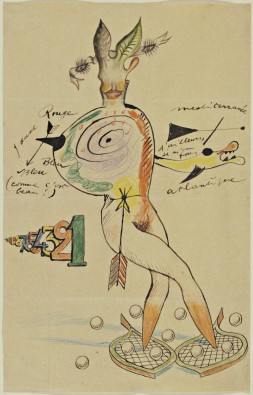
Text Generating Games and Automated Writing

Max Ernst, Yves Tanguy, Joan Miró, Max Morise, and Man Ray’s Cadavre Exquis at MoMA
If you’re like most writers I know, the hardest part about writing isn’t the actual writing or the revising so much as the getting started. I’ve talked before about how I don’t really believe in writer’s block, that a writer just needs to start writing and it will eventually slide into the creative realm, even if it starts out as something as simple as a journal entry. That said, I also know that my writer’s brain is a bit like the engine of an older car; it sometimes takes a little coaxing to get started. In my first undergrad creative writing class, one of our assignments was to create a text generating game that would get the body taking care of the physical act of writing while the brain warmed up to the idea, and I thought it might be nice to share one with you.
The exquisite corpse was popular among members of the Parisian surrealist movement about a hundred years ago, and while it often resulted in some truly bizarre drawings, it can also lend itself to surprising turns in poetry. This is a game that’s best played with at least a few other people, as you will take turns writing lines. If everyone has been having a tough time writing, consider having everyone start with a favorite line from a poem or song to kick off their exquisite corpse before passing it to the next person. As the papers pass, keep folding them so only the line you’ve written is visible before passing it to the next person.
The end result could be something as lyrically beautiful as Max Ernst, Yves Tanguy, Joan Miró, Max Morise, and Man Ray’s The Fugitive (above) or it might just be a nonsensical pile of words. But between all of the poems being passed around and lines written, it shouldn’t be hard to find a bit that inspires something more.
[youtube]https://www.youtube.com/watch?v=3p10knivMRg[/youtube]
If you’re a little more technically inclined, there are a wide range of predictive text generators that can analyze a sample of work and start generating writing that is in the style of that work. Mike Rugnetta on the PBS Idea Channel recently created a video with a script from a predictive text generator that sampled the scripts of all of the previous episodes of their web series. It’s strange and certainly nonsensical, but it has moments of truth and brilliance that felt worth sharing.
The next time you find yourself getting stuck, just try to do anything to leave the blank page/screen behind; worry about the goodness of the writing later.
